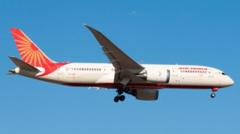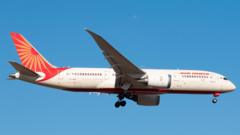In the wake of a devastating Air India tragedy that claimed 260 lives, India's aviation authority has mandated airlines to inspect fuel control switches on Boeing aircraft, reflecting growing scrutiny and safety measures within the aviation industry.
India Mandates Fuel Control Switch Inspections on Boeing Jets Following Tragic Air India Crash

India Mandates Fuel Control Switch Inspections on Boeing Jets Following Tragic Air India Crash
India's aviation regulator enforces inspections after a deadly Boeing crash raises global safety concerns.
India's Directorate General of Civil Aviation (DGCA) has taken decisive action by directing domestic airlines to conduct inspections of fuel control switches in Boeing airplanes. This response follows a catastrophic incident involving Air India Flight 171, a Boeing 787 Dreamliner, which crashed shortly after takeoff in June, marking one of the most severe aviation disasters in nearly a decade.
The DGCA's order comes on the heels of initial inspections already undertaken by several airlines, both within India and internationally. The USA's Federal Aviation Administration (FAA) has asserted the safety of the fuel control switches but this has not alleviated the concerns raised following the release of a preliminary investigation report that indicated a malfunction that severed fuel flow to the aircraft's engines shortly after departure.
With the DGCA setting a deadline of July 21 for these inspections, the emphasis is placed on strict compliance to ensure ongoing safety and airworthiness. This move aligns with a 2018 FAA advisory that recommended but did not require the inspection of the locking mechanism on fuel cut-off switches to prevent accidental disengagement. Unfortunately, Air India had not performed these inspections due to their non-mandatory status, as highlighted in the preliminary report by the Aircraft Accident Investigation Branch (AAIB).
The FAA, while acknowledging the advisory’s relevance, maintains that it does not believe the absence of mandated inspections renders the aircraft unsafe. Additionally, a representative group of Indian pilots has come forth to defend the actions of the Flight 171 crew, stating they adhered to their training during critical circumstances. The cockpit voice recording from the flight recorded an exchange between the pilots regarding the fuel switch's status, illustrating the confusion experienced during the emergency.
As various stakeholders respond to the findings of the preliminary report, further inspections are anticipated worldwide, signaling heightened vigilance within the aviation sector regarding the safety protocols of Boeing aircraft. Meanwhile, South Korea is reportedly preparing to issue similar inspection mandates for its airlines operating Boeing jets.
The ongoing investigation aims to clarify the incident without assigning blame while emphasizing the importance of aviation safety across borders.





















